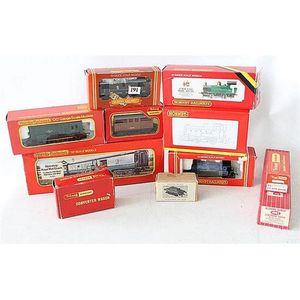
Mixed Boxed Train Models (11)
Eleven various Hornby, Tri-Ang and Dublo models, including four locomotives, boxed as is (11).
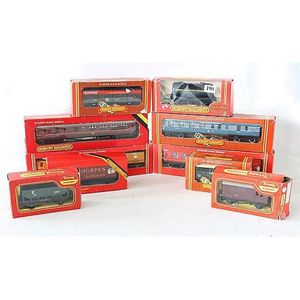
Boxed Hornby and Tri-Ang Models - 10 Varieties
Ten various Hornby and Tri-Ang models, including freight, tanker and carriage models, boxed (10).
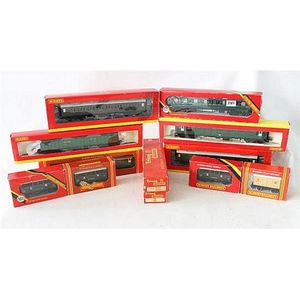
Boxed Hornby and Tri-Ang Models (12)
Twelve various Hornby and Tri-Ang models, including freight and carriage models, boxed as is (12).

Hornby and Tri-Ang Model Train Set (16)
Sixteen various Hornby and Tri-Ang models, including one locomotive and side Tipping car set, boxed as is (16).

Hornby Model Train Set with 9 Boxed Items
Nine various Hornby models, including four locomotives, passenger carriages, and Wayside station, boxed as is (9).
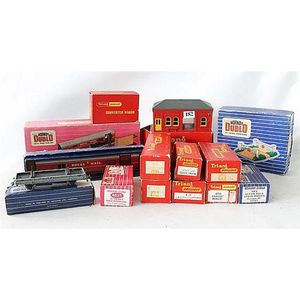
Hornby Dublo and Tri-Ang Model Set (14)
Fourteen various Hornby Dublo and Tri-Ang models, including T.P.O mail van set and Di Level Crossing, boxed, as is (14).

Hornby Boxed Models Set with Royal Mail and Cadbury Van
Eight Hornby boxed models, including three sets including Operating Royal Mail coach set, and closed van 'Cadbury', boxed (8).
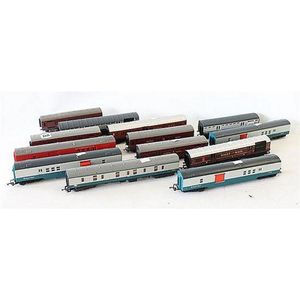
Unboxed Passenger Carriages Collection (13)
Thirteen various passenger carriages, including Hornby, Tri-ang and Lima, unboxed (13).
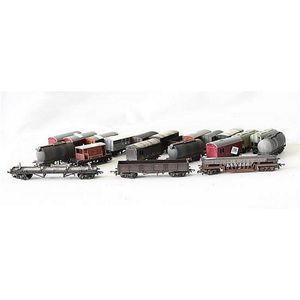
Unboxed Tri-Ang and Hornby Cargo Freight Carriages (qty)
A group of Tri-Ang and Hornby Cargo and freight carriages, including tankers, unboxed (qty).

Boxed Hornby Freight Carriages (12) - Various
Twelve various Hornby freight carriages, boxed, Af (12).
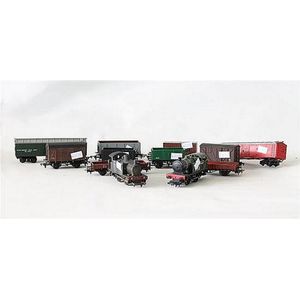
Unboxed Model Train Set with Freight and Locomotives
A small group of models, including Tri-ang, Hornby and Airfix, two locomotives and various freight, unboxed (12).
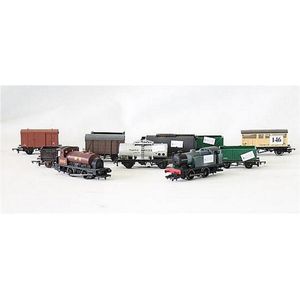
Unboxed Hornby, Tri-Ang, and Airfix Models (12)
A small group of Hornby, Tri-Ang and Airfix models, including two locomotives, unboxed (12).
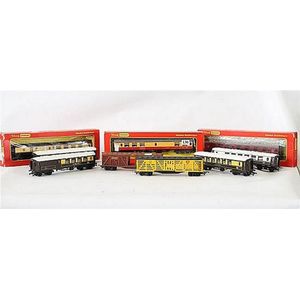
Tri-Ang Hornby Passenger and Freight Model Train Collection
Nine Tri-Ang Hornby models, passenger cars and two freight models, three boxed (9).
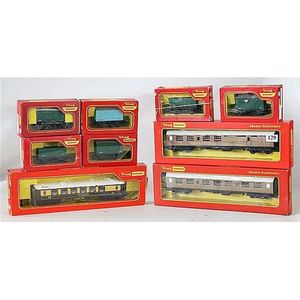
Tri-Ang Hornby Boxed Model Train Set (9)
Nine Tri-Ang Hornby models, including three passenger cars and six freight models, boxed (9).
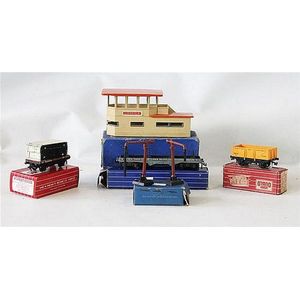
Hornby Dublo Models Boxed Set (5)
Five various Hornby Dublo models, including D1 signal Cabin, two Di water cranes, and U.G.B Sand wagon, boxed Af (5).
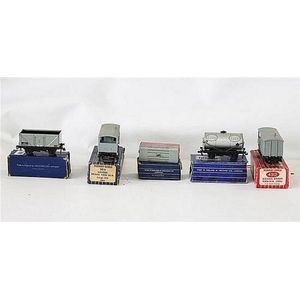
Hornby Dublo Models: 5 Boxed Varieties
Five various Hornby Dublo models, including goods brake van W.R 4312, and 'Esso' petrol tank wagon, boxed Af (5).
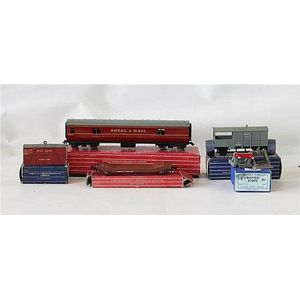
Boxed Hornby Dublo Models with T.P.O Mail Van
Five various Hornby Dublo models, including T.P.O mail van and Buffer stops, boxed (5).
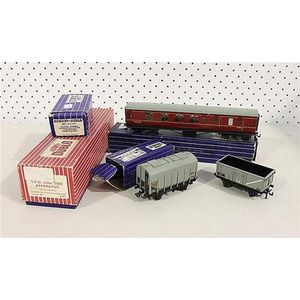
Hornby Dublo Models: T.P.O and Bulk Grain Wagon (5)
Five Hornby Dublo models, including T.P.O line side Apparatus and 20-ton Bulk grain wagon (5).
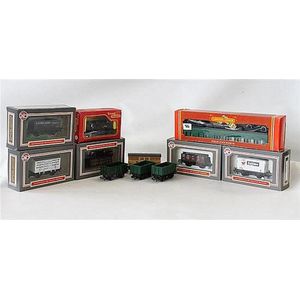
Freight Models and Carriage Collection
Eleven various freight models and a carriage, Hornby, Dapol and Tri-ang, seven boxed (11).
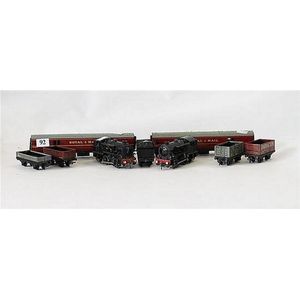
Assorted Unboxed Model Trains and Carriages (9)
Nine various models, including TTR locomotives and freight, and Hornby Dublo carriages etc, unboxed (9).
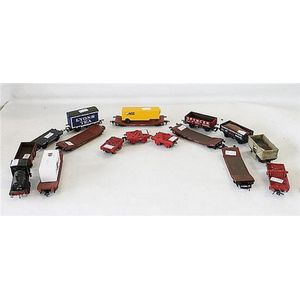
Hornby Dublo and Airfix Freight Train Set
Sixteen various Hornby Dublo and Airfix model freight carriages and a locomotive, including Lyons tea, unboxed (16).

Hornby Model Train Set with 9 Boxed Carriages
Nine various Hornby models, including freight and passenger carriages and L.M.S brake van with tail light, boxed (9).

Boxed Hornby Train Models (9)
Nine various Hornby models, including freight and passenger carriages and tanker, boxed (9).

Hornby Boxed Models: 8 Freight and Passenger Carriages
Eight various Hornby models, including freight and passenger carriages, boxed (8).

Hornby Boxed Train Set with Tanker, Passenger, and Freight Cars
Seven Hornby models, including tanker set, passenger carriages and freight, boxed (7).

Boxed Hornby Model Freight Carriages and Tankers (12)
Twelve various Hornby models, including freight carriages and shell tankers, boxed, Af (12).
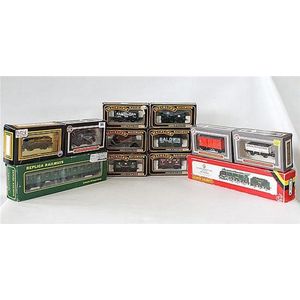
Boxed model train collection
Twelve various models, including Dapol and Mainline freight carriages, Hornby locomotive 'Sir Dinadan' S.R. King Arthur Class etc, boxed (12).

Hornby Carriages and Freight Set (10)
Ten various Hornby carriages and freight, including seven inclined Piers and horse box, all boxed (10).
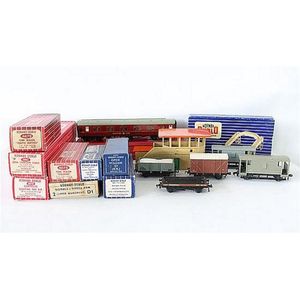
Hornby Duplo Train Set with 16 Models
Sixteen various Hornby Duplo models, including two composite sleeping car 4078, and station platform, mixture of boxed and unboxed (16).

Hornby Models and Accessories Set (11 Pieces)
Eleven Hornby models, including Hornby Duplo goods wagon 4640, 20-tonne Bulk grain wagon 4625, and two sets of Inclined Piers (11).
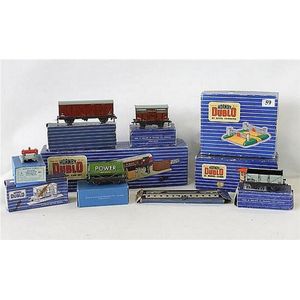
Hornby Dublo Petrol Tank and Cattle Truck Models Set
Ten Hornby Dublo models, including petrol tank wagon D1 'Power Ethol' and cattle truck D1 (10), Af.

Hornby Model Collection with N15 Locomotive and Wagon's
Thirteen various Hornby models, including Class N15 locomotive and tender 'Sir Dinadan', and two Bogie well wagon's (13).

Hornby Railway Collection: Freight, Crane, and Station
Twelve Hornby models, including freight carriages, crane and Doncaster station (12).

Hornby Railway Collection: Shunter Club Loco and More!
Twelve Hornby railways models, including 'Shunter Club loco' (12).

Boxed Hornby and Replica Railway Carriages (12)
Eleven Hornby model carriages, and one other replica railways carriage, all boxed (12).
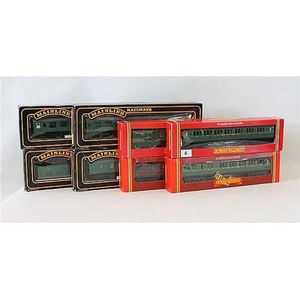
Mix of Mainline and Hornby Train Carriages
Eight various train carriages, four Mainline and four Hornby (8).
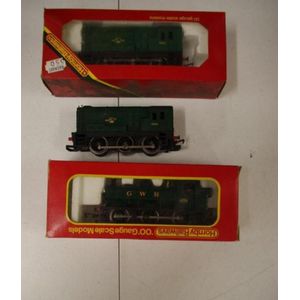
Hornby OO Gauge Loco Bundle
Three Hornby OO gauge locomotives comprising of 2 R.156 Class 08 diesel shunters and 1 R.041 GWR pannier tank loco

NSWR Diesel Locomotive and Break Van Set
Hornby railways OO gauge N.S.W.R diesel locomotive 34051, together with a N.S.W.R break van
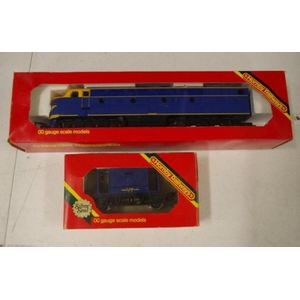
VR S Class Diesel Train and Break Van Set
Hornby railways OO gauge VR S Class Diesel train together with a VR break van

Hornby 'Spirit of Progress' Train Set
Hornby OO gauge 'Spirit of Progress' train loco and carriages, comprising of diesel locomotive, 2 first class carriages, 2 baggage cars and a dining car

20V French Hornby SNCF Autorail (2 Cars, Electric)
French Hornby O gauge 20 volt electric SNCF two-car Autorail. (VG)
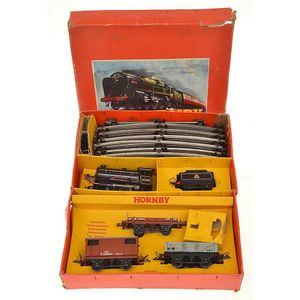
Hornby O Gauge Clockwork Train Sets (3) in Boxes
Three Hornby O gauge clockwork train sets. All in original boxes including no. 101 tank passenger set including LMS 0-4-0 tank locomotive, 2 x 1st/3rd passenger coaches, 1 x brake coach and track, in repaired box with picture label to lid; a no.50 goods…

Hornby Pre-War Speed Boat No.5 Viking with Box
Hornby pre war speed boat no.5 Viking, apricot deck, mint hull, key and mast present, worked well when tested, leaflet present, possible repaint, gold 'Viking' decal to bow hull and 'Hornby Speedboat product of Meccano Ltd Liverpool' to stern deck, box…
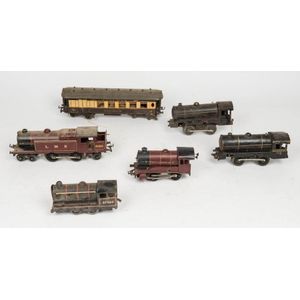
Vintage Hornby Train Set with 5 Locomotives and Carriage
Hornby tin plate clockwork locomotives (5) & a train carriage, early to mid 20th century. (6 items)
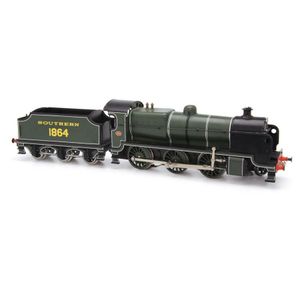
Hornby LMS Midland Compound Electric Train Set
Hornby Electric 4-4-0 LMS Midland Compound Loco and Tender.
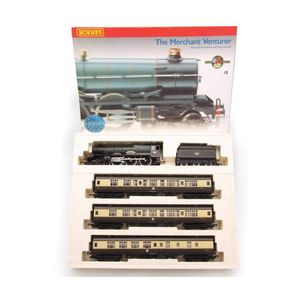
Limited Edition Hornby King Class Loco and Coaches Set
A boxed Limited Edition Hornby 00 gauge R 2077 'The Merchant Venturer'. King Class Loco and three coaches. BR 4-6-0 King John. Mint and unrun. 1618 of 2000.
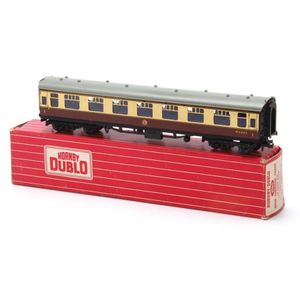
Hornby Dublo BR Coach 4060, Mint Condition
A boxed Hornby Dublo 00/H0 gauge Coach 4060 BR (W). Corridor 1st/2nd, two-rail. box: Excellent. Train: Mint.

Hornby O Gauge Goods Train Set with Tracks and Key
A boxed Hornby O gauge Clockwork Goods Train Set No. 601 Goods Train. With Tracks, clips and wind-up key.

Hornby LMS No. 1 Passenger Coach R155 (3113)
A boxed Hornby O gauge No. 1 Passenger Coach R155. LMS 3113.

French Hornby Hachette Goods Train Sets in Repro Boxes (2)
Two French Hornby Hachette goods train sets in reproduction boxes (2)

Hornby Train Sets: M1 Good Set and 101 Tank Passenger Set
Two Hornby train sets, including no. M1 good set, with a grey and beige coaches in Altered box; and no. 101 tank passenger set, track missing, box repaired (G-VG boxes F) (2)

Hornby Accessories: Stations and Depot (3)
Three Hornby accessories, including no. 3 station in original box lower, reproduction lid; no. 3 station and no. 1 goods Depot in reproduction boxes (G-VG boxes F-E) (3)

Hornby Accessory Collection in Reproduction Boxes
Collection of Hornby accessories, including two no. 1 Level Crossings; two footbridge station and signal boxes; and no. 2 signal box 'Windsor', all in reproduction boxes (a lot)
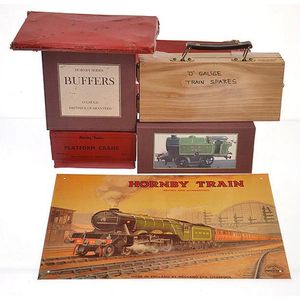
Hornby Accessories and More Collection
Collection of Hornby accessories and others, including A254 platform crane;101 tank loco LNER 460-touch ups; and track segments, some original boxes (a lot)

Hornby O Gauge Tank Loco with Guarantee & Receipt (1932)
Hornby O gauge no. 2 special tank locomotive, with original 'Hornby Guarantee' certificate and Receipt 1932, key Present (G box G)

Hornby Sets: Passenger and Goods Reproduction Boxes (3)
Three Hornby sets, including no. M2 passenger set; no. 1 passenger set; and no. 20 goods set in reproduction boxes (G-E boxes E-M) (3)

Hornby Goods Sets in Reproduction Boxes
Two Hornby sets, including 101 goods set; and no. 20 goods set in reproduction boxes (G-E boxes E-M)
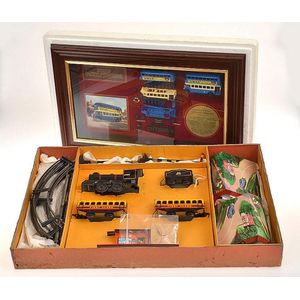
Mixed Clockwork Train Set and Limited Edition Leyland Titan
Clockwork train set with mixed parts, including Bing and Hornby; and Matchbox Models of Yesteryear limited edition framed Leyland Titan (VG-M boxes F-E) (2)

Hornby Hachette Train Sets (3) in Reproduction Boxes
Three Hornby Hachette train sets, including two steam trains and one Streamliner. In large reproduction boxes (E-M boxes E-M) (3)

Hornby GWT Coach - Missing Wheels and Axles
0 Gauge Hornby GWT Coach very good, missing wheels and axles.

Hornby LMS Tender, Boxed, Good Condition, 0 Gauge
0 Gauge Hornby No 2 Special Tender LMS good in box.

Hornby LMS Tender, No. 2 Special, Boxed, Excellent Condition
0 Gauge Hornby No 2 Special Tender LMS excellent in original box.

Restored Hornby No. 2 Special Tender for Eton Loco
0 Gauge Hornby No 2 Special Tender SR 900 for eton loco. Very good some restoration.

Hornby SR Coach in Repro Box - Excellent Condition
0 Gauge Hornby No 2 Corridor SR Coach very good in repro box.

Hornby SR Coach in Repro Box - Excellent Condition!
0 Gauge Hornby No 2 Corridor SR Coach very good in repro box.

Hornby SR Brake Coach in Repro Box - Excellent Condition
0 Gauge Hornby No 2 Brake Coach SR very good in repro box.

Hornby Southern 900 Tender for Eton Loco - Boxed
0 Gauge Hornby No 2 Special Tender Southern 900 for Eton loco boxed.

Hornby SR Brake Coach in Repro Box - Excellent Condition
0 Gauge Hornby SR Brake Coach very good in repro box.

Hornby LMS Suburban Brake Coach in Repro Box
0 Gauge Hornby LMS Suburban Brake Coach very good in repro box.

Hornby LMS Coach in Repro Box - Excellent Condition
0 Gauge Hornby LMS 1st & 3rd Coach very good in repro box.

Hornby LMS Coach in Repro Box - Excellent Condition
0 Gauge Hornby LMS 1st & 3rd Coach very good in repro box.

Hornby No 50 Refrigerator Van, Excellent Condition, Boxed
0 Gauge Hornby No 50 Refrigerator Van excellent, boxed.

Hornby No 50 Refrigerator Van in Box - Excellent Condition
0 Gauge Hornby No 50 Refrigerator Van very good in box.

Hornby Princess Elizabeth Loco & Tender, Boxed, Missing Wheels
0 Gauge Hornby 462 Princess Elizabeth Loco & Tender excellent, boxed but missing front 4 bogie wheels.

Hornby Eton 440 Loco & Southern 900 Tender Set
0 Gauge Hornby Eton 440 Loco 20v Electric in excellent original condition, complete in box together with Southern 900 Tender in excellent condition but unboxed.

Hornby Eton 440 Loco Clockwork in Excellent Condition
0 Gauge Hornby Eton 440 Loco Clockwork very good original condition.

Southern 1759 Loco & Tender with Modern Motor
0 Gauge Hornby 440 Loco & Tender Southern 1759 12v Electric lots of touch ups & modern motor. Compound engine. Good.



















 Loading more...
Loading more...